Wisdom Tooth Extraction in Bedford and Fort Worth
Removing Your Third Molars for Your Oral Health
Sometimes your wisdom teeth might do more harm than good for your smile. They can cause significant pain, change the alignment of your grin, and may even increase your risk for an oral infection. It’s therefore often recommended to have your wisdom teeth removed before they can lead to any problems. Dr. Bodapati is more than prepared to help guide you and your loved ones through the wisdom teeth extraction process. Please call us if you have questions about the procedure.
Why Choose Pleasant Dental for Wisdom Teeth Extractions?
- Same-Day Emergency Appointments Available
- Office That’s Open 6 Days a Week
- Advanced Dental Technology
What are Wisdom Teeth?
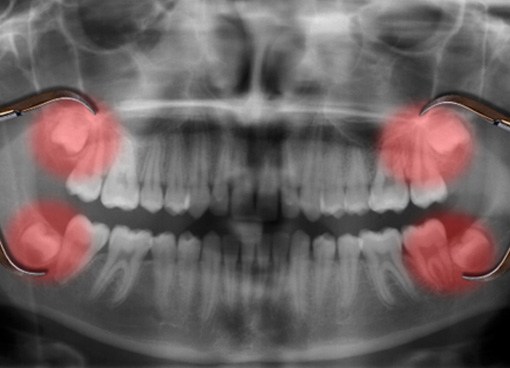
Wisdom teeth are located at the very back of your mouth. They are often referred to as the third molars, and they normally come in between the ages of 17 and 25. Oftentimes, there isn’t enough space in your mouth for wisdom teeth because all of your other teeth have already erupted by that point. Consequently, there’s a chance that your wisdom teeth might become partly or completely impacted under your gums, which can lead to all kinds of problems.
Why Do Wisdom Teeth Need to Be Removed?
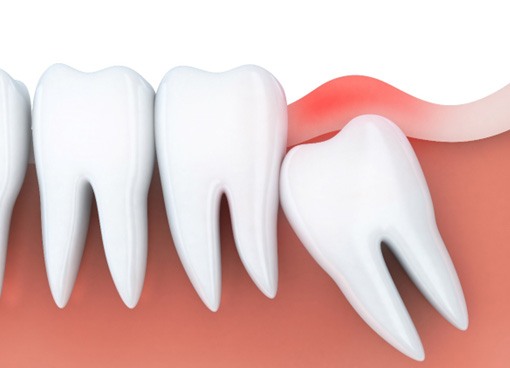
While wisdom teeth extraction is sometimes viewed as a rite of passage for teenagers and young adults, it’s not always necessary. We only recommend having your wisdom teeth removed if they truly pose a threat to your oral health. Some of the signs that indicate that an extraction might be needed include:
- Wisdom teeth that have failed to break through the gums.
- Symptoms associated with infection, such as swelling.
- Pain in the back of your mouth that doesn’t go away.
- A change in the alignment of your bite.
What to Expect from the Wisdom Teeth Procedure

Wisdom teeth that remain trapped under the gums will have to be extracted surgically. The process involves making an incision in the gums, and the tooth in question might need to be divided into sections that can be removed separately.
If the wisdom teeth have managed to erupt and are visible above the gumline, the extraction process is much simpler. We can use special instruments to loosen the teeth before taking them out with forceps.
Recovering from Wisdom Teeth Extraction

It’s up to you to take care of your mouth while it’s healing after wisdom teeth extraction. Here are some of the steps you will need to take:
- Use a cold compress to keep swelling down.
- Take over-the-counter pain medication if you’re experiencing any discomfort during your recovery.
- Maintain a soft-food-only diet for a few days.
- Take it easy. Don’t engage in any sort of strenuous physical activity.
- Make sure that your head stays elevated at all times. (Naturally, this includes when you go to sleep.)
- Avoid drinking through a straw or doing anything else that could result in a dry socket.
- Contact our office immediately if you notice unusual symptoms (such as pain that doesn’t fade away after a certain period of time).
Understanding the Cost of Wisdom Tooth Extractions
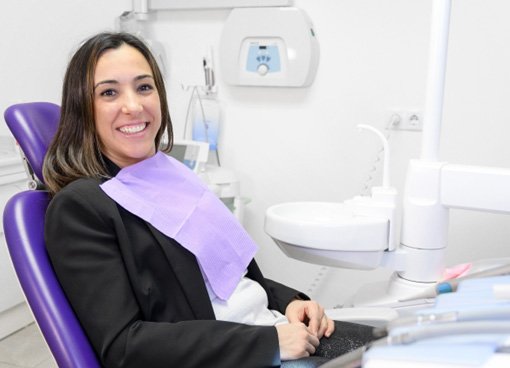
When the time comes to have your wisdom teeth removed, one of the first things you will want to figure out is how much you can expect to pay for your treatment. Our team can explain the factors that influence the final price and give you a reliable estimate. On top of that, we can file any necessary insurance claims on your behalf, and we can help you explore other options for managing the cost of your care.
Factors That Can Impact the Cost of Wisdom Tooth Extractions
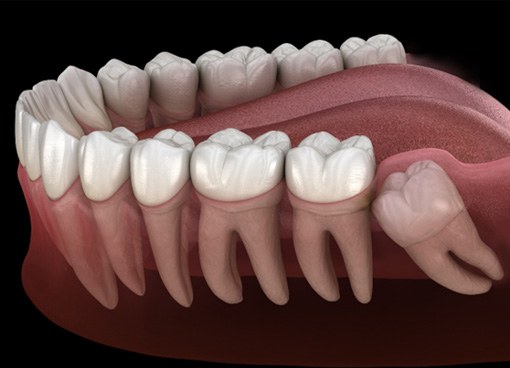
The number of wisdom teeth that need to be removed can affect the overall cost of the procedure. While most people have four wisdom teeth, others might have three or fewer.
Additionally, the complexity of the procedure makes a difference. Wisdom teeth that have managed to at least partially emerge from beneath the gums tend to cost less to extract compared to wisdom teeth that are completely impacted.
If you plan on having dental sedation administered during your wisdom tooth extraction, it will add to the overall cost. Our practice offers both oral conscious sedation and nitrous oxide sedation; each option comes with its own price tag to think about.
Finally, there’s the matter of who performs your surgery. In particularly complex cases, we may need to refer you to an outside specialist, and this can end up influencing the amount you need to pay.
Does Dental Insurance Cover Wisdom Tooth Extractions?

If a wisdom tooth extraction has been determined to be medically necessary in your case, there is a good chance that your dental insurance plan will at least partially pay for it. Based on your circumstances, the coverage you receive for a wisdom tooth extraction could be anywhere from 50% to 80%. Note that your deductible and your annual maximum may affect the amount that you need to pay out of pocket.
Of course, the specifics of your dental insurance plan depend heavily on which dental insurance carrier you have. Before you visit our office to discuss having your wisdom teeth removed, we recommend that you take the time to review your benefits. Our team members can assist you if you have any questions regarding your dental insurance.
How to Make Wisdom Tooth Extractions Affordable

As part of our efforts to make our services more accessible to our patients, we offer an in-house membership plan. Once you sign up for said plan, you will be able to enjoy discounts on many of our services, allowing you to save money on your care even if you don’t have dental insurance.
We can also help our patients apply for financing. You can sign up for CareCredit or Sunbit Financing, both of which offer payment plans that come with low interest or even no interest. It’s often easier to pay for your care in installments that are right for your budget.
Wisdom Tooth Extractions FAQs
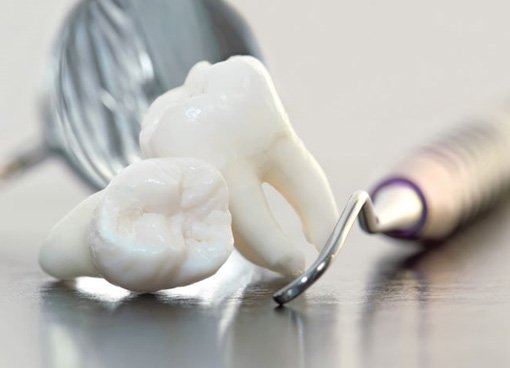
Dr. Bodapati and our team are ready to help you find relief from wisdom tooth pain and prevent the problems that these teeth can cause. Before you schedule your consultation, however, you might want to learn more about wisdom teeth and the extraction procedure. To assist you in your quest to gather information, we have put together the following list of FAQs. If you do not find the answers to your questions, please give us a call. We would be happy to speak with you!
Why Do We Have Wisdom Teeth?
The most widely accepted theory about wisdom teeth goes back to our ancient human ancestors. They ate a rough diet that included things like raw meat, nuts, roots, berries, and leaves. Because the foods they consumed were so tough, their teeth tended to wear out quickly. They needed a third set of molars to help them eat.
Many experts believe that consuming tough foods, particularly in childhood, stimulates growth of the jaw, making it more likely that a person will have room in their mouth for their wisdom teeth. However, that is quite uncommon today.
Why Are Wisdom Teeth Called That?
Wisdom teeth can cause a lot of problems, so at a glance, it might seem counterintuitive to label them with such a positive-sounding name. However, their title does not come from what they do. Rather, it stems from when they develop. Most people’s wisdom teeth start to grow sometime in late adolescence or early adulthood, well after their other permanent teeth have finished growing. At this age, people are older and “wiser” than they were when they received their other teeth.
Does Everyone Have Wisdom Teeth?
Most people develop four wisdom teeth, but there are quite a few exceptions. According to an article from the Dental Research Journal published in 2015, somewhere between 5% and 37% of people are missing at least one wisdom tooth. Some individuals have no wisdom teeth at all. Rarely, a person might develop more than four wisdom teeth.
If you cannot see your wisdom teeth, do not assume that you do not have them. They might simply be stuck beneath the gumline (impacted). A dental X-ray is the only way to find out for sure if you have them.
What Is the Best Age to Get Wisdom Teeth Removed?
Wisdom tooth removal tends to be easiest when a person is a teenager or in early adulthood. Many people in this age group have breaks from school that they can use to recover from their procedure. Plus, because the roots of wisdom teeth tend to become more strongly embedded in the jaw as time passes, early removal is always recommended.
However, older patients can get their wisdom teeth removed as well. There is no upper age limit for the procedure. It can be successfully performed on individuals in their 30s, 40s, and beyond.


